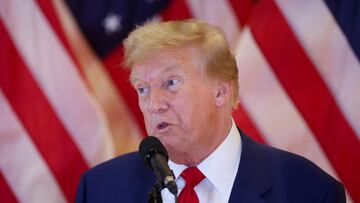Key moments of Donald Trump’s press conference: ‘We’re living in a fascist state’
Trump’s press conference highlights included a stark and misleading claim: “We’re living in a fascist state,” reflecting his criticism of current U.S. political conditions.


Yesterday, Donald Trump became the first US president to be convicted of a felony after leaving office. A jury of his peers convicted the former president on 34 Class E Felony counts for falsifying business records to cover up the use of campaign funds to make a ‘hush money’ payment in 2016. The payment was made to an adult film star, Stephanie Clifford, known professionally as Stormy Daniels, when concerns arose that an alleged affair between Mr. Trump and Ms. Clifford could become public during his first presidential run.
Donald Trump’s response to the verdict has been about as predictable as possible, voicing outrage at the process, Judge Juan Merchan, District Attorney Alvin Bragg, the judicial system, and all other ‘enemies’ who landed him in his current position.
During a press conference on Friday, Donald Trump described the US as a “fascist state,” showing how meaningless the concept of fascism has become in American political discourse. For the far-right, calling other people fascist is often a way to dilute the insult, and their deployment of the term shows that they either have no idea what it means or they are hoping to willfully mislead the public.
What did Trump say?
After explaining that people from all continents besides Europe are illegally entering the US by the millions, Donald Trump said, “We have a president and a group of fascists that don’t want to do anything about it.” Some on the political left might agree with this description if the “group of fascists” the former president was referring to were his supporters on Capitol Hill. The former president’s most loyal followers in Congress have stood in the way of passing any legislation on immigration, even bills that include extremely punitive measures for migrants, including forced detention and closing the border once a certain number of people have entered the country.
The speech was the first time Donald Trump could address the country on television since the conviction was announced. He used the time to attack his political rivals and accuse the Democrats of weaponizing the judiciary against him. All accusations he made before and throughout the trial ended up with him being placed under a gag order by Judge Merchan. The gag order was another topic covered during the press conference. On top of his views on the trial, the GOP frontrunner for the White House also used the opportunity to attack Joe Biden and other political rivals.
What is fascism?
Fascism, though notoriously difficult to define, is a right-wing ideology that limits the civil and political rights of certain groups through the use of oppressive state powers that aim to squash dissent. It is right-wing in that the group in power tends to be socially conservative and supports the creation of an economic system that works to undermine workers and unions by allowing private entities to exploit the workforce with the backing of the state apparatus.
Is the United States a fascist country?
This is an interesting and hotly debated question. Some political analysts warn that the way both parties have deployed the term undermines the threat of fascism and the impact it would have on public life.
Democratic leaders have been more willing to call Donald Trump and other leaders in his party fascist but stop short of describing the US political system in such terms.
For the more extreme right-wing faction of the Republican party, calling others fascist is often a way to dilute the insult, and their deployment of the term shows that they either have no idea what it means or they are hoping to willfully mislead the public.
Related stories
Compared to the political systems of other comparable nations to the US, both the Democrats and Republicans are right-wing. Social democracies, which allow a regulated market to function and protect citizens through a robust social safety net, are still considered capitalist economies. Spain’s leading political party, the Spanish Socialist Worker Party, takes a social democratic approach to legislating. More socialist policies, some of which have been undertaken by social democracies, like public ownership of key industries, are only supported by a tiny fraction of Democrats, with that same small contingent being the only faction within the US political system calling for a single-payer healthcare system, as is seen in most other developed economies. Republicans and more ‘centrist’ Democrats argue that a private healthcare system is better for patient outcomes. However, that is not easy to prove when, of the 49 OECD countries, the US ranks 35th in life expectancy.
What is the difference between fascism and authoritarianism?
These two terms are often conflated; they are different, with authoritarian being a way to describe a regime. One could say that all fascist regimes are authoritarian, but not all authoritarian regimes are fascistic. The United States has authoritarian elements—for example, the immunity of police officers when it comes to unjustifiable killing and physical violence. Additionally, the Patriot Act, passed after 9/11, allows the US security state access to personal communications that law enforcement authorities typically need a warrant to view. In some states, voter suppression is carried out through gerrymandering and wiping people from voter registration lists without informing them that they will need to re-register.
Complete your personal details to comment